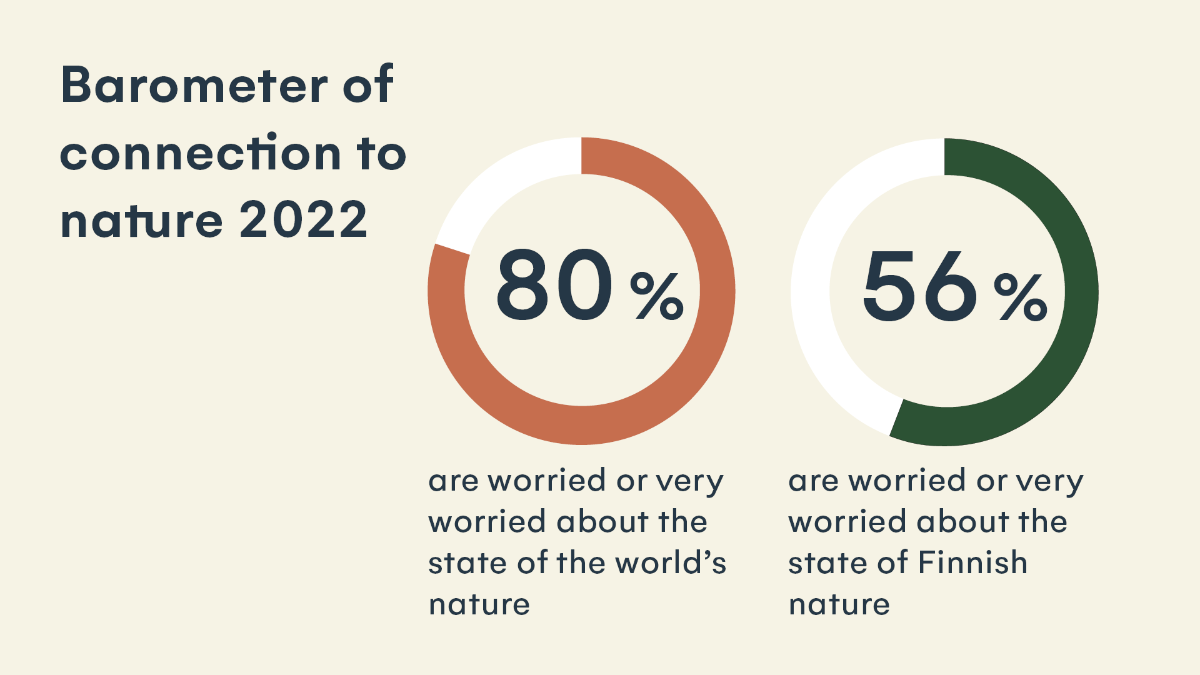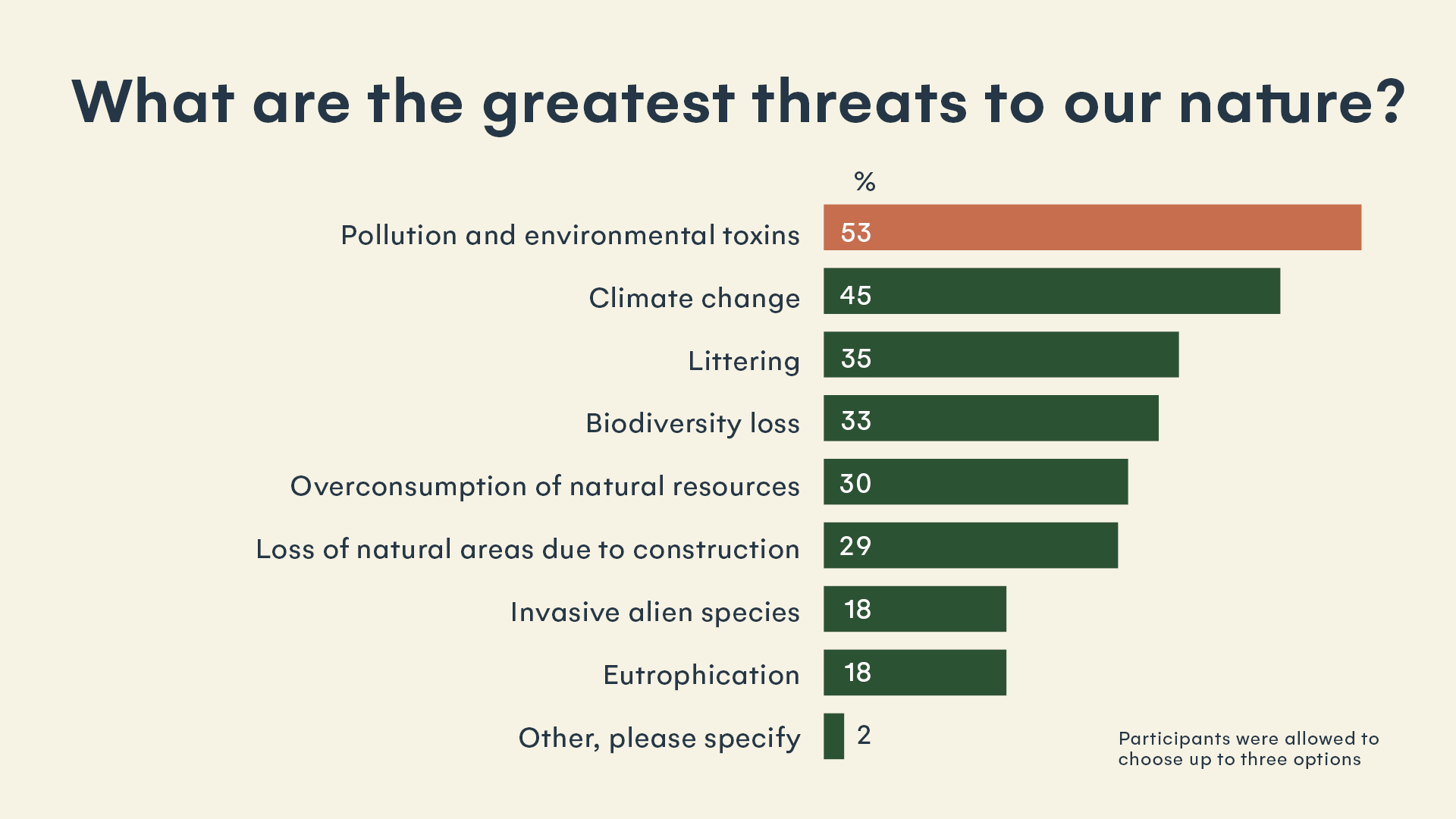Finns are increasingly worried about state of nature – biodiversity loss is now recognised as threat

Finns are clearly much more worried about the state of nature on the global scale than about the state of Finnish nature. A barometer on the connection to nature was conducted to find out about our relationship with nature and with preserving biodiversity, and how the responsibilities should be divided between the different stakeholders.
56% of the respondents are worried or very worried about the state of Finnish nature, while 80% are worried or very worried about the state of the world’s nature. Compared to the barometer conducted in 2020, the worry about the state of nature has grown, both globally and concerning Finland. The percentage of those worried about the state of the world’s nature increased by 9% and the percentage of those worried about the Finnish nature by 15%.
47% of the respondents have become more aware of biodiversity and biodiversity loss in recent years e.g. through information they have seen in the media. The awareness has grown, in particular, among entrepreneurs and under-25-year olds. The majority (68%) are interested in the natural environment and biodiversity.
20% of the respondents feel that their connection to nature has changed during the COVID-19 pandemic. Of them, 92% feel that the connection has become more positive. The connection to nature has changed during the pandemic especially among students and pupils and under 25-year-olds. A majority of the Finns (92%) consider that clean nature is an important part of the Finnish identity.
Biodiversity loss included in list of major threats to nature

The respondents considered pollution and environmental toxins (53% of the respondents), climate change (45%), littering (35%) and biodiversity loss (33%) to be the greatest threats to our nature. This means that the importance of the threat of biodiversity loss has increased compared to the first survey, where 25% of the respondents considered biodiversity loss a threat.
Pollution and environmental toxins came up as the greatest threats to our nature in many categories of respondents. Littering was a major issue for under 25-year-olds (58%) and climate change for students and pupils (56%).
From the perspective of the protection and sustainable use of biodiversity, 86% of the respondents considered it important to reduce eutrophication, the use of pesticides and littering. The majority of the respondents felt that nature enhances people’s health and wellbeing, and the value of nature cannot be measured in money. In addition, the respondents considered that nature should be taken into account better when developing cities.
Responsibility of Finnish nature rests with us all
In the respondents’ opinion, the main responsibility for the protection and sustainable use of biodiversity in Finland rests with every citizen. State and municipal authorities, companies, landowners and politicians are also responsible. The same stakeholders came up in the survey conducted in 2020. Compared to 2020, the number of responses where companies had a great or very great responsibility rose by 5%
The majority (89%) consider nature as important or very important. There are some differences in this between age categories. 45 to 64 year olds considered nature the most important, students and pupils the least important.
Of the respondents, 51% were acting for the benefit of biodiversity. Most of them are doing this by taking biodiversity into account in their consumption and eating habits. The most important motivating factors for acting for the benefit of biodiversity were the importance of nature (58%) and children and future generations (48%).
Finns spend lots of time in nature
Of the respondents, 41% spend time in nature several times a week and just 3% never do this. Green areas and parks near people’s homes are important for Finns: 40% of the respondents considered these as the most important natural environments. In 2018, the same 40% of the respondents considered these as the most important nature areas, while in the 2020 survey this percentage was just 32%. Of the categories of respondents, students and pupils (56%) and those living alone (50%) considered nearby green areas as particularly important, while for entrepreneurs they were less important (24% considered them important).
60% of the respondents prefer to enjoy the peace and quiet of nature and 54% wish to engage in physical activities. Picking berries or mushrooms and hiking in forests are among the most popular nature activities.
73% of Finns engage in physical activities in their own yards several times a week, and 45% engage in physical activities in the green areas and parks near their home several times a week. People spend less time than this in national parks, other protected areas and hiking areas and the surroundings of their holiday homes. Young adults (under 25-year-olds) now spend more time than before in national parks, protected areas and hiking areas.
Third barometer on connection to nature
This was the third time the barometer on the connection to nature was conducted, commissioned by the Ministry of the Environment and the Finnish Environment Institute SYKE. The previous ones were in 2020 and 2018. The survey was conducted by MDI, a consulting company specialised in regional development, and respondents were sought through the CINT service.
64% of the respondents were women. The share of women was 14% higher than in the survey conducted in 2020. This time there were no over 65-year-olds among the respondents, but in 2020 their share was 14%.
Inquiries:
Henna Birkman
Communications specialist
Ministry of the Environment
tel 029 525 0299
[email protected]
Riku Lumiaro
Biodiversity and Communications specialist
Finnish Environment Institute
tel 0295 251 394
[email protected]
